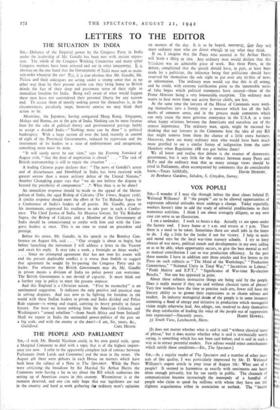VOX POPULI
Stu,—I wonder if I may slip through before the door closes behind D. Welstead Williams? If " the people " are to be allowed opportunities of expression editorial attitudes must undergo a change. Today especially, workers haven't time to add the study of editorial predilections to their numerous activities. I think I am about averagely diligent, so my own case can serve as an illustration.
I am a toolmaker. I work to hours a day. Actually II are spent under the factory roof. I leave home at 7 a.m. and return at 7 p.m. Then there is a meal to be taken. Sometimes there are small jobs in the home to do. I dig a _little for the larder if not for victory. I help to make and mend toys for the local war-time nursery schools. I try to keep abreast of war news, political trends and developments in my own calling so as to be able, when opportunity occurs, to give the best mental as well as manual contribution I can to war production efficiency. In the past three months I have in addition sent three articles and five letters to the Press on such subjects as " The Mind of the Workshops," "Production Committees," "National Unity in Total War," " Incentives to Labour," "Profit Motive and E.P.T.," " Significance of War-time By-election Results." Not one has appeared in print.
About these subjects instructive things are being said by the people. Does it really matter if they are said without classical turns of phrase? Very few workers have the time to practise such arts, fewer still have the literary ability so to groom their expressions as to charm editors and readers. In industry managerial doubt of the people is in some instances stemming a flood of energy and initiative in production which managerial vision might otherwise lead. Areeditois, too, resolved to deny themselves the deep satisfaction of leading the voice of the people out of suppression into expression?—Sincerely yours, HARRY HOWELL. 33 South View, Letchworth, Herts.
[It does not matter whether what is said is said " without classical turns of phrase," but it does matter whether what is said is intrinsically worth saying, is something which has not been said before, and is said in such a way as to attract potential readers. Few editors would reject contributions which satisfy those conditions.—En., The Spectator.]


























 Previous page
Previous page